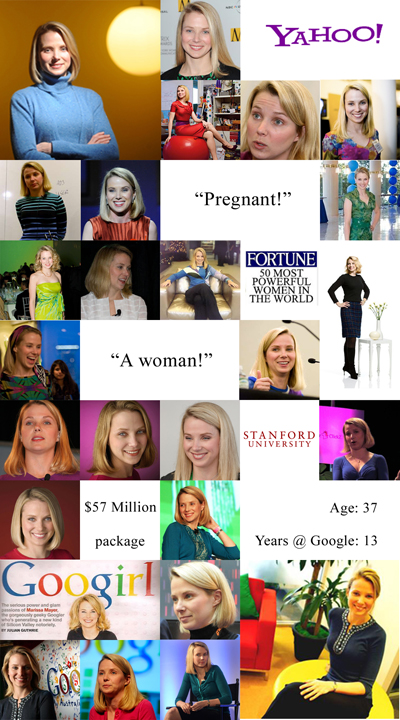Marissa Mayer as the new Yahoo CEO: On the challenge, her details, and the risk of the "impostor syndrome"
Marissa Mayer made a buzz when she became CEO of Yahoo last week. Headlines have focused on the relevant (her accomplishments), the irrelevant (her “fabulous” lifestyle), and the questionable (she’s pregnant). I consider how much of our success is due to our ability and hard work and how much is just opportunity and luck. The answer I expect resides in a humble place in the middle somewhere between extreme self views of a god and an impostor.
Take the Yahoo Challenge!
When Marissa Mayer took the role as CEO of Yahoo, she made news for all sorts of reasons. Foremost was the daunting challenge of turning around a company plagued with stalled revenue growth. Yahoo search revenues bring into question its arrangement with Microsoft and the general opinion is that revenue is “flat… but not falling off a cliff”.
Mayer is also the 5th CEO in a year. Colourful Carol Bartz was fired after a two-year term, after which CFO Tim Morse temporarily took the helm. Scott Thompson then did a four-month stint, during which he let go 2,000 staff, initiated patent lawsuits with Facebook, and then quit amid a scandal about erroneous details on his resume. Ross Levinsohn acted as interim CEO, bringing the count to number four. The board, of which nine of eleven members are new this year, started yet another executive search.
The turnover path is not as bad as it would appear, showing a termination (Bartz) and one recruitment error (Thompson), with a couple of positions in the interim. The disruption is unfortunate, however, in the midst of the flat revenue. As a Forbes article noted, “no one in his or her right mind” would take the role”. Other comments include “we are getting to the point where there has been too much turmoil for too long a period and a turnaround will just not be viable anymore” and “anyone who has [the] qualifications is too smart to take the job”. I wonder if Hulu CEO read comments such as these before he declined the Yahoo offer last week.
Marissa who? Oh, and she’s pregnant.
Along comes Marissa Mayer, with credential to back up her selection. A Masters graduate of Stanford, Marissa started as Google employee number 20 and has been there for the past 13 of her 37 years. As a result of Google going public, Marissa has an estimated worth of $300 million and serves on Wal-Mart’s board of directors. Marissa has made Fortune magazine’s annual list of 50 Most Powerful Women in Business for the past four years running and was selected as one of Glamour Magazine’s Women of the Year in 2009. Despite the kudos, I take heart in Mayer describing Google’s process design as “managed chaos” and saying of the early days “I’m not really sure how we even made it”.
Marissa’s appointment has been a PR feast as journalists and bloggers take their angle. Some talk about her “fabulous” life, the development of her leadership style, and on being competitive with Facebook and Google.
The dominant voice seemed to focus on the fact that she is a woman and several stories discussed the fact that she announced she is pregnant at the same time as the CEO appointment. I acknowledge an unbalanced gender diversity in the c-suite and board level still mandates her appointment as a woman is notable, but I will be glad when the word “pregnant” is no more appropriate in a news headline than announcing a “black” president. When it is no longer note-worthy, then we will have arrived.
Personal reflection on the imposter syndrome
I had to wonder why I gave the story so much thought. I am not particularly interested in Yahoo and have not come across Mayer in my internet travels. Perhaps I see in the headlines a path that is both hard-earned and fortunate.
Google was Mayer’s first gig out of University. While she has worked her way up through the ranks in her 13 years at the company to being responsible for over 1,000 staff, Google is her only context. At 37, age alone could lend itself to insecurities as previous CEO Bartz was 62, Thompson 54, and Levinson 48. Then again, perhaps that is just my own bias talking as I stare up at executives on the ladder who are lower on the age scale than I.
Opportunity and genetics can assist, but they need to be supported by perseverance. Supporting research that shows long hours alone are not an indicator of burnout, Mayer has talked about her need for just four to six hours of sleep a night – she catches up by taking week-long vacations every four months. She states “I don’t believe it’s true that you burn out sooner or later if you work 80 hours a week, as long as you keep the thing that’s important to you sacred.”
While no CEO of a public company (yet), I look at my own opportunities that have been provided me and could see how Mayer could consider the common ailment of “impostor syndrome“. The condition refers to the idea that competent people find it hard to believe in their own capabilities or internalize their own accomplishments. Opportunities leveraged in the first management role, being born into the right family, and even the genetic roll of the die can lead to thoughts of “Why me and not someone else?”.
That form of thinking can be dangerous in that it can turn into a self-fulfilling prophesy. Followers think as the leader thinks, or more accurately, the self-perceptions we project often have a greater impact than the perceptions of those around us. If the leader thinks “why me”, the followers may echo with “Now that you mention it, yes, why you?”
The CEO role in Yahoo will be a closely watched case study over the next several months and is a unique opportunity for Mayer. Opinions will pour from keyboards, telling Mayer that “The new CEO needs to start with a clear vision of what they want Yahoo to be and where they want Yahoo to lead, then plan and execute to that direction” or even telling her to update her social media expressions.
The reasons why Mayer got there are now no longer pertinent. Like every opportunity presented, it is now up to her to do something with it. From that perspective, she is just like the rest of us.



While I agree that being pregnant is not relevant to her appointment, it does spark my interest. Being a working mother is not new and yet sometimes it feels like there are no examples, no tips and that you need to struggle along making the same mistakes as many other people have probably made before.
I have been given all the flexibility I could dream of and yet at times I have felt like a failure both as a mother and as a worker. I have since heard comments from others that they feel the same. Hopefully the story sparks healthy discussion about the challenges and not judgement on mother’s choices.
Thanks for the comment, Carly! You raise an important point about having role models as examples. Whether it is a working mom or an executive balancing profits, moral, and family, there is a perceived expectation that you should have it all together. Anything perceived by others or ourselves as less than text-book performance can feel like a failure. Having those role models who can share the ups and downs can help people get through. I am with you in pursuing discussion over judgement, from others or herself. 🙂